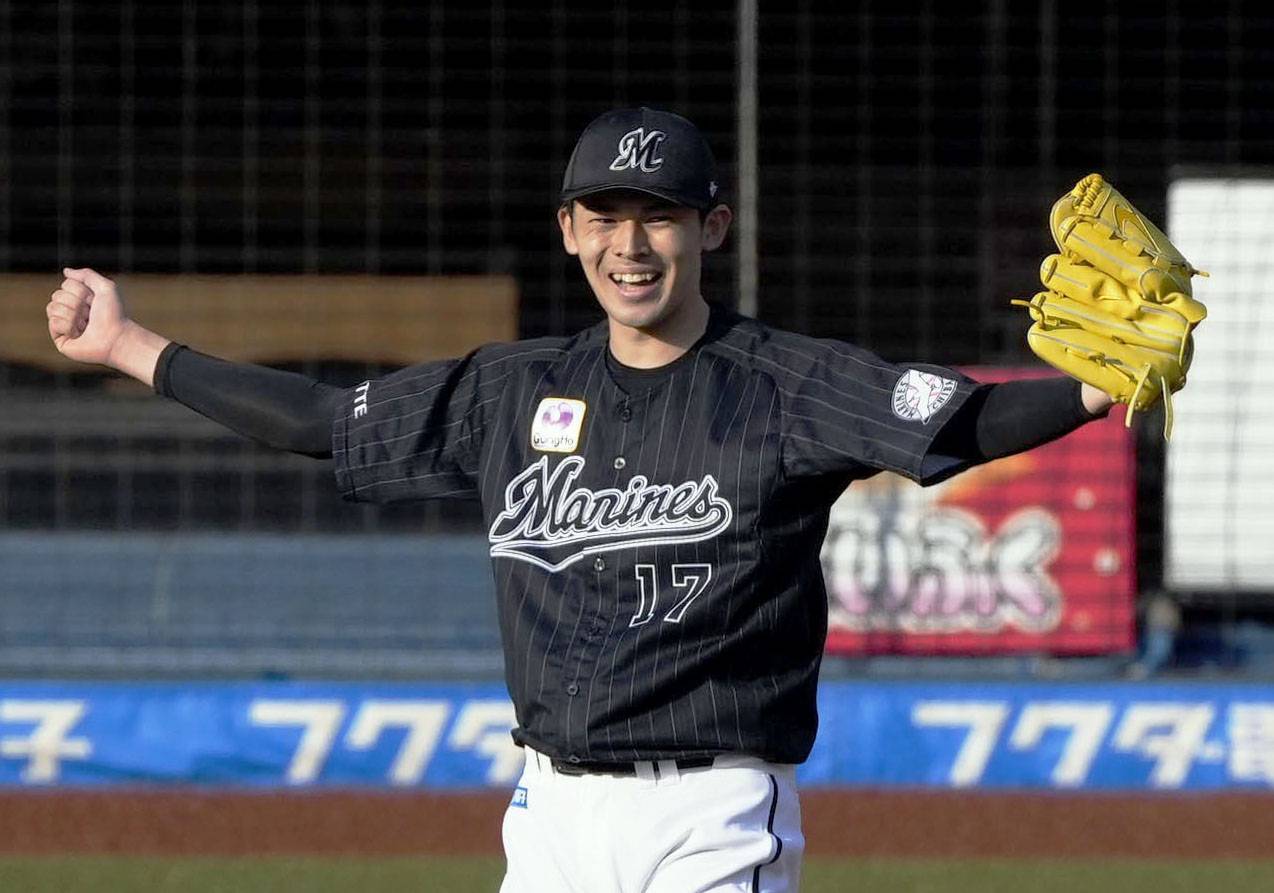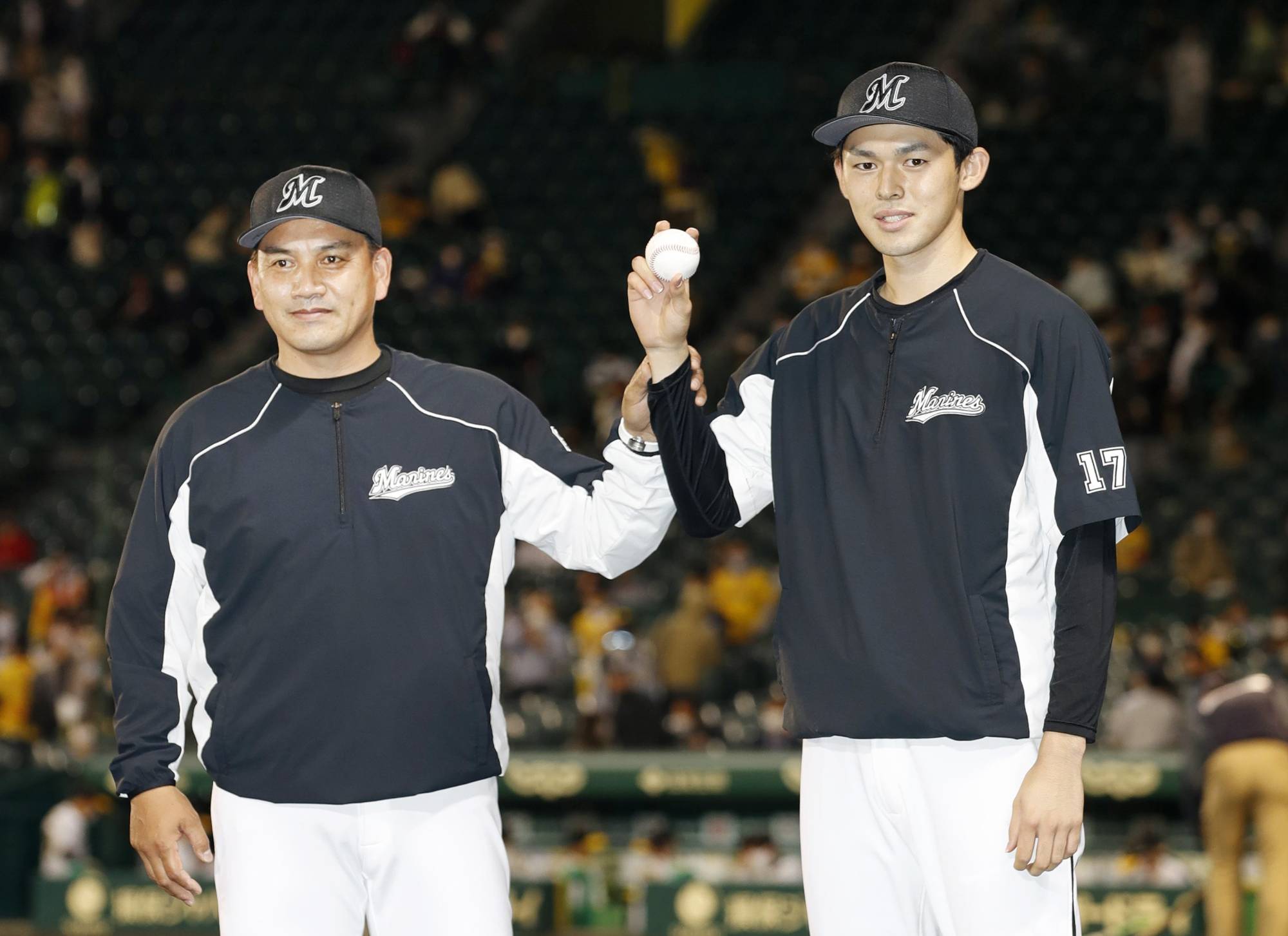Once the brightest star in Japan’s amateur baseball constellation, 20-year-old Roki Sasaki has overcome a slow start to his pro career and has now pitched perhaps the world’s greatest nine-inning game.
On April 10, the Chiba Lotte Marines’ lanky 190-centimeter right-hander blew past the Nippon Professional Baseball record of nine consecutive strikeouts with 13 straight. By retiring all 27 batters he faced, he threw Japan’s first perfect game in 28 years, while tying NPB’s record for total strikeouts with 19.
After the game, Sasaki expressed joy in his achievement, but was otherwise matter of fact about something no one else had ever done.
“I’m glad to have done something that will last,” he said.
Sasaki’s perfect game achieved a “game score” — a measure developed by groundbreaking analyst Bill James — of 106, one better than the highest ever recorded in MLB for a nine-inning game.
Sports website DAZN streamed the Pacific League game between the Marines and Orix Buffaloes, and reported the broadcast attracted a record number of viewers for the site’s Japanese pro baseball content.

While at Iwate Prefecture’s Ofunato High School, Sasaki, began attracting the attention of Major League Baseball scouts even before a pitch of his at a national youth team training camp was clocked at 163 kilometers (101.3 miles) per hour by an NPB scout.
When his high school manager opted not to pitch Sasaki in Iwate’s prefectural championship game, whose winner would advance to the national championship finals at iconic Koshien Stadium, many throughout Japan were outraged.
It was Sasaki’s senior year, and his final chance to play on the national stage as a high schooler, and he was not injured. Concerned about Sasaki’s low bone density, the manager wanted to protect his arm for the future, something that goes against the grain of Japanese high school baseball’s belief in sacrificing everything for victory.
The Marines beat out three other teams in a four-way draft day lottery for Sasaki in 2019, but sidelined him for the entire 2020 season as Lotte’s management, like Sasaki’s high school coach, took a long view of their prize prospect.
This too, drew criticism, since top prospects, especially those with dominant skills, typically see at least some first-year action with the major league club.
Manager Tadahito Iguchi and pitching coach Masato Yoshii, who both played in MLB, oversaw a program to patiently build up Sasaki’s physical strength. After making his top-team debut in May 2021, Sasaki was still used sparingly, only appearing in 11 games last season.
“Yoshii explained what the plan was, so Sasaki not pitching in his first year caused no concern for us,” one MLB team’s scout said.
In his first games last season, Sasaki tried out all his pitches while struggling with his command in the heat of top level competition. By season’s end, however, he was striking out more hitters, walking fewer and getting better results.
Last August, he had a triumphant homecoming of sorts when he pitched and won at the home of northeastern Japan’s only pro team, in neighboring Miyagi Prefecture.

Sasaki’s father was killed in the March 11, 2011, tsunami that swept away his home and forced his family to relocate within Iwate Prefecture. Asked about it in his postgame hero interview in the northeastern city of Sendai, Sasaki displayed no hint of excitement or emotion.
“I’m glad I could pitch well, and I’m thankful to my teammates for their run support,” he said.
His understated postgame presence mimics his pitching style. Although he has repeatedly been clocked at 164 kilometers per hour in games this season, he does so with an almost effortless delivery.
By the end of last season, Sasaki appeared on the verge of a breakthrough. It came this spring with all the speed of one of his fastballs.
“I imagined he was capable of this,” Iguchi said after the perfect game. “I just didn’t think it’d happen so soon.”
Sasaki’s average fastball velocity last season, according to Japanese pro baseball analytics website Delta Graphs, was 152.9 kilometers per hour. Through three starts this season, it’s 159.1 (or 98.86 miles) per hour, a stat surpassed last year by only one MLB starting pitcher — two-time Cy Young Award winner Jacob deGrom.
MLB fans, however, will likely have to wait until at least 2027 to see Sasaki’s high-octane pitching arsenal in person. That will be the first year current MLB rules would allow him to earn a payday commensurate with his talent.
“The only question (between now and then) is his health,” another MLB scout said.
“On any given day, he could be the best pitcher in the world. His splitter is as good as Shohei Ohtani’s.”
In a time of both misinformation and too much information, quality journalism is more crucial than ever.
By subscribing, you can help us get the story right.
KEYWORDS
Source : Baseball – The Japan Times